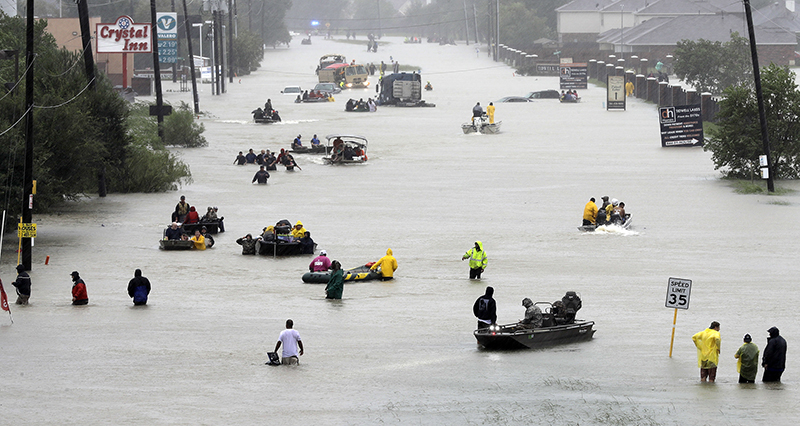That is the word that many are using to describe the unprecedented devastation of Houston, Texas, in the wake of Tropical Storm Harvey.
“A disaster of biblical proportions.”
By the time the storm is over, 20 trillion gallons of rain might have fallen.
That amounts to about ten percent of Lake Erie.
Let’s talk about Noah.
In this week’s haftarah portion, God promises the Jewish people that they will return from their exile in Babylonia, and come home to the land of Israel.
For this to Me is like the waters of Noah:
As I swore that the waters of Noah nevermore would flood the earth,
So I swear that I will not be angry with you or rebuke you.
For the mountains may move and the hills be shaken,
But my loyalty shall never move from you,
Nor my covenant of friendship be shaken – said the Lord, Who takes you back in love.
God is saying: I promised Noah that I would never again send a flood. I have kept that promise. I promised that you would come home to the land of Israel. I will keep that promise as well.
So, why Houston? Didn’t God say that God would never do this again?
God did not bring these storms, and God did not bring these waters, and God did not bring these floods.
But:
- those who have denied the scientific evidence that undergirds climate change
- those who are in denial over the fact that we should be expecting more extreme weather patterns
- those urban planners who do not take the natural consequences of development into consideration…
I am not saying that those people “caused” the tragedy of Houston. That would be far too glib.
But, the biblical God wants people to use their wisdom, and to contribute to the building of the world, and not its devastation.
Another piece of the “biblical” thing.
The Bible says that Noah was righteous. Sure, Noah saved his family and the animals.
But, that was all. Noah ignored everyone else.
God saw that Noah only cared about his own family — and then, after the flood, proceeded to get drunk. (Call it survivor guilt, if you want).
A favorite Hasidic story. A boy asks his father why the stork is called a hasidah, a loving one.
The father replies: “Because the stork is so loving to its young.”
“So,” the boy asks, “if that is true, why is the stork treif (not kosher)?”
“Because,” the father replies, “the stork is only capable of showing love to its own.”
God waited ten more generations — for Abraham, who saw that Abraham would go beyond his own family and speak up for the innocent people of Sodom and Gomorrah.
God fell in love with Abraham’s character – and that is why Abraham, not Noah, was the first Jew.
Be biblical like Abraham — reaching out to others — and not biblical like Noah — caring only for your own.
Out of all the wonderful stories that you have been reading – neighbors helping each other; people offering boats to strangers; flotillas sailing down raging rivers that used to be streets – there is one overarching meaning.
It means seeing every person as a potential ally.
As David Suissa wrote in the Jewish Journal of Los Angeles:
In the middle of rescue missions, no one cares whether you voted for Trump or Clinton, whether you’re antifa or nationalist, whether you’re black or Hispanic or Jewish or Muslim, whether you’re transgender or redneck. When Mother Nature attacks, we’re all created equal. We’re all neighbors.
Let us rejoice in what the descendants of Abraham and Sarah are doing to help. Israel is sending aid to Houston – helping to remove debris, cleaning homes, and offering trauma support.
This is what Israel does – and it is far from the first time.
Several years ago, I was sitting in a plane next to a man who was returning from helping out during the earthquake in Haiti. In our conversation, I mentioned that I was a rabbi, and he said: “Can I shake your hand? Because you need to know how helpful your people were for all of us in Haiti.”
By “your people,” he meant Israeli aid workers.
For that, too, is biblical.
As are Jewish summer camps, that are opening up their doors for those whom the storm has displaced.
Abraham and Sarah were known, particularly, for their hospitality to those in need. Those Jewish camps are doing the Abraham and Sarah thing.
That, too, is biblical.
I conclude with the words of David Suissa:
It’s a shame that it takes such disasters to bring out the better angels of our nature. Maybe, then, if we want to truly honor the victims of Houston, we will allow those angels to stay awhile.
Want to really bring out the better angels of our nature?
Do something.
- Contribute money to the rescue efforts. Do it through the Reform movement, or any other place that suits your soul.
- Even more important — Houston residents need gift cards to help replenish and replace supplies. Target, Loews, Home Depot, Kroger. Send them to: Rabbi David Lyon, Congregation Beth Israel, 5600 N. Braeswood Blvd, Houston, TX. 77096.
Doing is biblical. The best kind of biblical.






